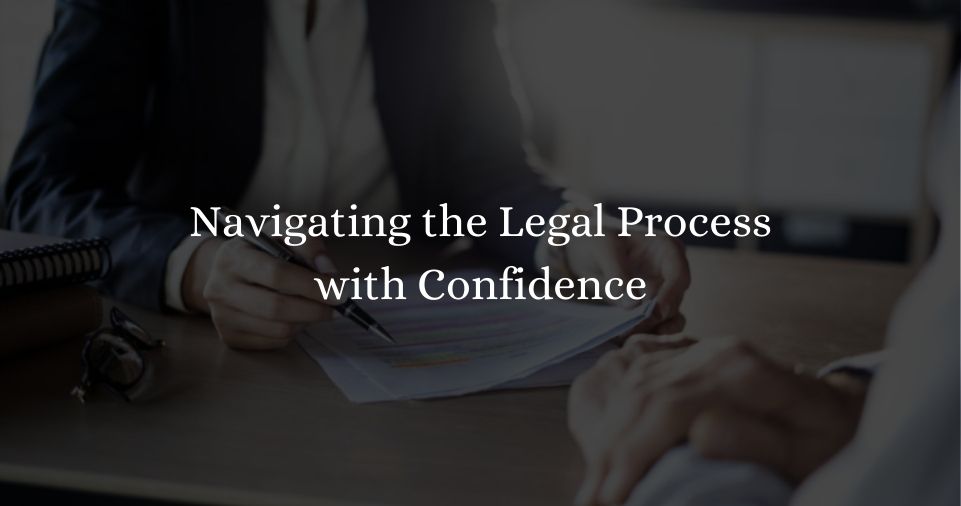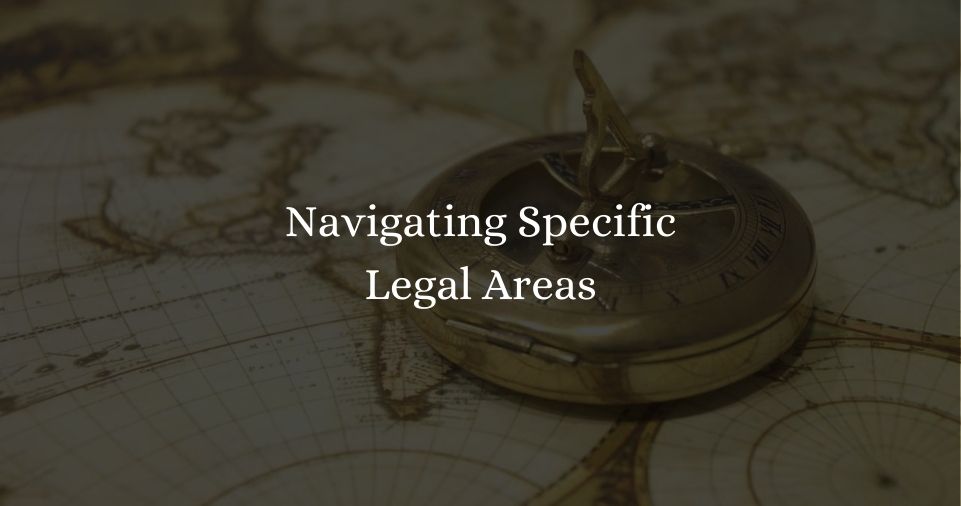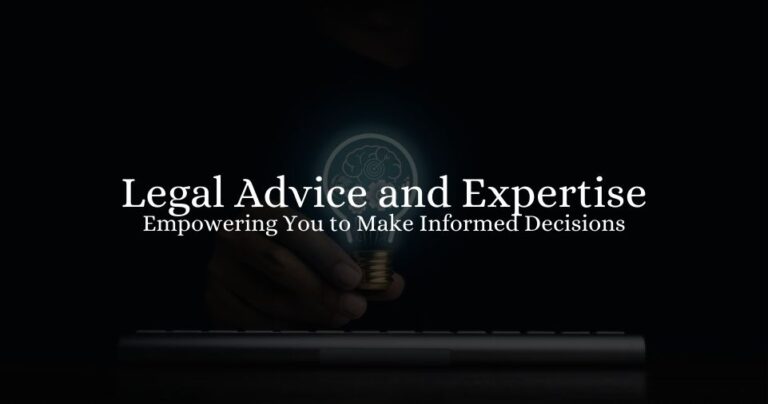Welcome to our comprehensive guide on legal advice and expertise. As you navigate the complexities of the legal landscape, it’s common to encounter challenges and uncertainties that leave you seeking guidance. We understand the frustrations and the importance of making informed decisions that can have long-lasting consequences. That’s why we’re here to provide you with the solutions and resources you need to empower yourself and confidently navigate the legal world.
Legal matters can be overwhelming and intimidating, especially when you lack the necessary knowledge and expertise. From understanding complex legal terminology to navigating intricate processes, it’s easy to feel lost and uncertain. But rest assured, you’re not alone. Many individuals, just like you, face similar challenges when it comes to legal matters.
In this blog post, we promise to equip you with the tools, insights, and expert advice you need to overcome these challenges and make informed decisions. Our goal is to demystify the legal process and empower you to take control of your legal matters with confidence. Whether you’re facing a personal injury claim, drafting a contract, or navigating a family law dispute, we have the solutions to help you.
Through this comprehensive guide, we’ll delve into various topics and provide practical advice, real-life examples, and expert insights to address your legal concerns. From understanding the benefits of seeking professional legal advice to finding the right expert for your specific needs, we’ll guide you through the entire process. You’ll gain a deeper understanding of the legal system, learn how to effectively communicate with legal professionals, and discover valuable resources to aid you in your journey.
We understand the pain of feeling overwhelmed and uncertain when dealing with legal matters. It can be a time-consuming and emotionally draining process. But with the right guidance and expertise, you can alleviate that burden. Our aim is to provide you with the clarity and confidence you need to navigate the legal landscape successfully.
Finding the Right Legal Expert for Your Needs
Identifying the areas of law relevant to your situation is the first step in finding the right legal expert to assist you. Just as you wouldn’t consult a cardiologist for a dental issue, it’s crucial to match your legal needs with the appropriate specialization. Let’s say you’re dealing with a personal injury claim resulting from a car accident. In this case, you’ll want to consult with an attorney who specializes in personal injury law rather than one who focuses on corporate law.
Once you’ve identified the relevant areas of law, it’s time to delve into researching and selecting a reputable legal expert. This process can seem overwhelming, but fear not! We’ve got some helpful tips to guide you through:
- Seek Recommendations: Reach out to trusted friends, family members, or colleagues who have dealt with similar legal matters. Their personal experiences can provide valuable insights and recommendations. However, it’s important to remember that what worked for someone else may not necessarily be the best fit for your unique situation.
- Utilize Online Directories: Online legal directories are a treasure trove of information. Platforms like Avvo, FindLaw, and Justia allow you to search for lawyers based on their practice areas, location, and client reviews. Take advantage of these resources to gather a list of potential legal experts that align with your needs.
- Check Credentials: Once you have a list of potential candidates, it’s essential to verify their credentials. Ensure they are licensed and in good standing with the relevant bar association. Look into their educational background, years of experience, and any additional certifications or accolades that demonstrate their expertise in the field.
- Schedule Consultations: Meeting with potential legal experts is crucial for assessing their compatibility with your case. Schedule consultations with the top contenders on your list to discuss your situation, ask questions, and gauge their level of interest and commitment. Treat these consultations as interviews, as you’ll want to ensure that you have a good rapport and feel comfortable working with the attorney you choose.
Remember, finding the right legal expert is not a one-size-fits-all process. Each case is unique, and the attorney-client relationship is built on trust and understanding. Take the time to do your research and consider multiple factors before making a final decision. By following these tips, you’ll be well on your way to finding a legal expert who can provide the advice and expertise you need.
Navigating the Legal Process with Confidence

Understanding Key Legal Terminology and Processes
Legal proceedings can often feel like traversing through a labyrinth of complex terminology and processes. However, having a basic understanding of key legal terms and procedures can empower you to navigate the system with confidence. Let’s explore a few essential concepts to get you started:
- Jurisdiction: Jurisdiction refers to the authority of a court to hear and decide a case. It determines which court has the power to handle a particular matter based on factors such as geographic location and subject matter.
- Complaint: A complaint is a legal document filed by a plaintiff to initiate a lawsuit. It outlines the allegations against the defendant and requests a specific remedy or compensation
- Discovery: Discovery is the process by which both parties gather evidence and information relevant to the case. It can involve methods such as depositions, interrogatories (written questions), and document requests.
- Due Process: Due process ensures that individuals are treated fairly and their rights are protected throughout the legal proceedings. It involves the right to be heard, present evidence, and have a fair and impartial trial.
By familiarizing yourself with these fundamental legal terms, you can better comprehend the conversations and documents involved in your case. It’s important to note that this is just a starting point, and the legal landscape is vast. Don’t hesitate to consult with your legal expert for further clarification on any specific terms related to your situation.
Tips for Effective Communication with Legal Professionals
Clear and effective communication with your legal professionals is crucial for a successful outcome. Here are some tips to ensure you effectively convey your needs and understand the information provided:
- Active Listening: When consulting with your legal expert, actively listen to their advice and explanations. Take notes, ask questions for clarification, and seek examples or analogies to enhance your understanding. By actively engaging in the conversation, you’ll gain a deeper comprehension of the complexities involved in your case.
- Be Transparent and Detailed: Provide your legal expert with all the relevant details and information related to your case. The more accurate and comprehensive the information, the better equipped they will be to strategize and represent your interests effectively.
- Ask for Plain Language Explanations: Legal jargon can be overwhelming, so don’t hesitate to ask your legal expert to explain complex concepts using plain language. A good attorney will be able to break down complicated ideas into understandable terms, ensuring that you are well-informed and confident in your decision-making process.
- Keep the Lines of Communication Open: Establish clear channels of communication with your legal expert, whether it’s via email, phone calls, or in-person meetings. Regularly check in for updates and provide any new information that may arise. Effective communication builds trust and a stronger working relationship with your legal team.
Remember, effective communication is a two-way street. Be an active participant in your legal matters, and don’t hesitate to ask questions or seek clarification whenever necessary. The more you understand the processes and terminologies, the more confident and empowered you’ll feel throughout your legal journey.
Empowering Yourself Through Knowledge and Resources
Accessing Legal Databases and Online Resources
In today’s digital age, a wealth of legal information and resources is just a few clicks away. Accessing legal databases and online resources can empower you with valuable knowledge to navigate your legal matters. Here are some key platforms and tools to consider:
- Legal Databases: Legal databases like Westlaw, LexisNexis, and Bloomberg Law provide comprehensive access to statutes, regulations, case law, and legal commentary. These platforms are often used by legal professionals and offer in-depth research capabilities to help you understand the relevant laws and precedents.
- Government Websites: Government websites, such as those maintained by federal and state courts, provide access to court opinions, rules, and forms. For example, the website of the U.S. Supreme Court offers a vast array of resources, including transcripts of oral arguments and opinions.
- Legal Blogs and Websites: Many legal professionals and organizations maintain blogs and websites that offer valuable insights and practical information on various legal topics. These resources can provide plain-language explanations, real-life examples, and practical tips that can enhance your understanding of complex legal issues.
- Online Legal Communities: Participating in online legal communities and forums can be a great way to connect with other individuals facing similar legal challenges. These communities provide a platform for sharing experiences, asking questions, and receiving guidance from legal experts and peers.
Remember to critically evaluate the information you find online, as not all sources may be reliable or up-to-date. Cross-reference information from multiple sources and consult with a legal expert to ensure accuracy and applicability to your specific situation.
Learning from Real-Life Case Studies and Examples
Real-life case studies and examples can be invaluable resources for understanding legal concepts and strategies. By examining how others have navigated similar legal situations, you can gain insights and learn from their experiences. Here’s how you can leverage real-life case studies and examples:
- Legal Publications and Journals: Legal publications and journals often feature case studies and analysis of notable legal cases. These publications provide detailed explanations of the legal issues involved, the strategies employed, and the outcomes. By studying these cases, you can gain a deeper understanding of legal principles and how they are applied.
- Court Opinions: Court opinions, particularly those from higher courts, offer a wealth of information on legal reasoning and interpretations. Reading judicial opinions can provide insight into how judges analyze and decide legal disputes, which can be useful when formulating your own legal arguments or understanding potential outcomes.
- Legal Seminars and Webinars: Attend legal seminars, workshops, or webinars that focus on specific legal areas or case studies. These events often feature expert speakers who share their knowledge and experiences, providing practical insights and guidance.
By immersing yourself in real-life case studies and examples, you can develop a deeper understanding of legal concepts and strategies. This knowledge will empower you to make informed decisions, communicate effectively with legal professionals, and actively advocate for your rights.
Taking Control of Your Legal Matters
Strategies for Effective Legal Research
When facing a legal issue, conducting thorough research is essential to ensure you have the knowledge and information needed to make informed decisions. Here are some strategies to help you conduct effective legal research:
- Start with Reliable Sources: Begin your research by consulting authoritative and reputable sources such as legal textbooks, treatises, and scholarly articles. These sources provide a solid foundation and can offer in-depth insights into the legal principles relevant to your case.
- Utilize Online Legal Research Tools: Online legal research tools, such as Fastcase, Google Scholar, and Casemaker, can be valuable resources for finding relevant case law, statutes, and regulations. These tools often have user-friendly interfaces and advanced search features to help you locate the most pertinent information efficiently.
- Access Legal Databases: Take advantage of subscription-based legal databases like Westlaw and LexisNexis, which offer comprehensive collections of legal materials. These databases allow you to search for case law, statutes, regulations, secondary sources, and more, enabling you to delve deeper into your legal issue.
- Consult Legal Experts: Seeking advice from legal professionals, such as attorneys or legal researchers, can provide valuable insights and guidance. They can help you navigate complex legal concepts, identify relevant precedents, and provide an expert perspective tailored to your specific situation.
By adopting these strategies, you can gather the necessary information to better understand the legal landscape and make informed decisions about your legal matters.
Empowering Yourself to Negotiate and Advocate for Your Rights
While legal professionals can provide guidance and expertise, it is essential for you to actively participate in the resolution of your legal matters. Here are some tips to help you negotiate and advocate for your rights effectively:
- Understand Your Rights and Legal Position: Educate yourself about the applicable laws and regulations related to your case. Knowing your rights and understanding the strengths and weaknesses of your legal position will empower you during negotiations or court proceedings.
- Prepare and Organize Documentation: Gather and organize all relevant documents, including contracts, correspondence, and any evidence supporting your case. A well-prepared and organized file will not only strengthen your arguments but also demonstrate your commitment and seriousness.
- Develop Effective Communication Skills: Good communication is crucial when dealing with legal matters. Clearly and concisely articulate your position, concerns, and desired outcomes. Active listening is equally important, as it allows you to understand the other party’s perspective and respond thoughtfully.
- Consider Alternative Dispute Resolution: Alternative dispute resolution (ADR) methods, such as mediation or arbitration, can provide a less adversarial and more cost-effective approach to resolving legal disputes. Research the advantages and considerations of ADR methods to determine if they are suitable for your situation.
Remember, advocating for your rights does not mean being confrontational or aggressive. Instead, it involves assertively presenting your case, seeking compromises, and exploring mutually beneficial solutions.
The Benefits of Alternative Dispute Resolution
Exploring Mediation and Arbitration as Alternatives to Litigation
When it comes to resolving legal disputes, traditional litigation is not the only path to consider. Alternative Dispute Resolution (ADR) methods, such as mediation and arbitration, offer viable alternatives that can save you time, money, and the stress associated with a courtroom battle.
- Mediation: Mediation involves a neutral third party, known as a mediator, who facilitates communication between the parties involved in the dispute. The mediator helps them identify common ground, explore potential solutions, and reach a mutually satisfactory agreement. Mediation is a voluntary and non-binding process that empowers the parties to maintain control over the outcome.
- Arbitration: Arbitration, on the other hand, is a more formal process where the dispute is presented to an arbitrator or a panel of arbitrators. These neutral individuals hear the arguments and evidence from both sides and render a binding decision, known as an award. Unlike mediation, arbitration is often conducted in a private setting and follows rules similar to those of a court.
Understanding the Advantages and Considerations of Alternative Dispute Resolution Methods
- Advantages of ADR: One of the significant advantages of ADR is the potential for a faster resolution compared to traditional litigation. ADR processes are generally more streamlined, allowing for efficient dispute resolution. Additionally, ADR can be more cost-effective, as it reduces the need for extensive court proceedings and associated legal fees. Moreover, ADR offers a more collaborative and flexible environment, where parties can preserve relationships and work towards mutually beneficial solutions.
- Considerations for ADR: While ADR methods have many benefits, it’s essential to consider certain factors before deciding if they are suitable for your situation. For instance, the willingness of the parties to cooperate and engage in a constructive dialogue is crucial for successful mediation. In arbitration, the parties surrender some control over the outcome to the arbitrator’s decision. It’s important to carefully review any agreements or contracts that may require ADR methods for dispute resolution.
By exploring alternative dispute resolution methods like mediation and arbitration, you can potentially achieve a more satisfactory resolution while avoiding the time-consuming and costly nature of traditional litigation.
Navigating Specific Legal Areas

Personal Injury Claims: Understanding Your Rights and Seeking Compensation
When you suffer injuries due to someone else’s negligence or intentional actions, understanding your rights and seeking proper compensation is crucial. Personal injury law encompasses a wide range of accidents and injuries, including motor vehicle accidents, slip and falls, medical malpractice, and more.
- Establishing Liability: In personal injury claims, establishing liability is paramount. This involves demonstrating that the other party’s actions or negligence directly caused your injuries. Gathering evidence such as medical records, witness statements, and accident reports can strengthen your case.
- Seeking Compensation: If you have a valid personal injury claim, you may be entitled to various types of compensation, including medical expenses, lost wages, pain and suffering, and more. Consulting with an experienced personal injury attorney can help you navigate the legal complexities and ensure you pursue the full extent of compensation you deserve.
Family Law Disputes: Custody, Divorce, and Child Support Matters
Family law matters can be emotionally challenging, but understanding your rights and legal options is crucial for a smoother resolution. Here are some key considerations for common family law disputes:
- Custody and Visitation: When dealing with child custody disputes, the court’s primary focus is the best interests of the child. Understanding the factors that influence custody decisions and working towards a parenting plan that promotes the child’s well-being is vital.
- Divorce Proceedings: Divorce involves the dissolution of a marriage and encompasses various legal aspects such as asset division, alimony, and child custody. Seeking legal advice and guidance can help you navigate the divorce process and protect your rights and interests.
- Child Support: In cases involving children, child support ensures that the noncustodial parent contributes financially to the child’s upbringing. Understanding the factors that influence child support calculations and seeking appropriate legal advice can help ensure a fair arrangement.
By familiarizing yourself with the legal aspects of personal injury claims and family law disputes, you can approach these specific legal areas with more confidence and make informed decisions.
May Also Like Reading: Unlocking the Power of Social Media: Strategies for Effective Online Marketing 2023
Conclusion
Throughout this comprehensive guide, we have explored various aspects of legal advice and expertise, equipping you with valuable knowledge to navigate the complexities of the legal system. From finding the right legal expert to understanding key legal processes, accessing resources, and exploring alternative dispute resolution, you now have a solid foundation to take control of your legal matters.
Remember, the key to success is empowerment through knowledge. By familiarizing yourself with relevant legal areas, conducting effective research, and advocating for your rights, you can approach legal challenges with confidence and make informed decisions that align with your best interests.
While this guide provides a wealth of information, it’s important to recognize that every legal situation is unique. When faced with complex or critical matters, seeking professional legal advice from experienced experts is highly recommended. They can provide tailored guidance and help you navigate the specific nuances of your case.
By leveraging legal advice and expertise, you can ensure that your rights are protected, your voice is heard, and your desired outcomes are pursued. Embrace the power of knowledge, and empower yourself to make informed decisions that will shape your legal success.







